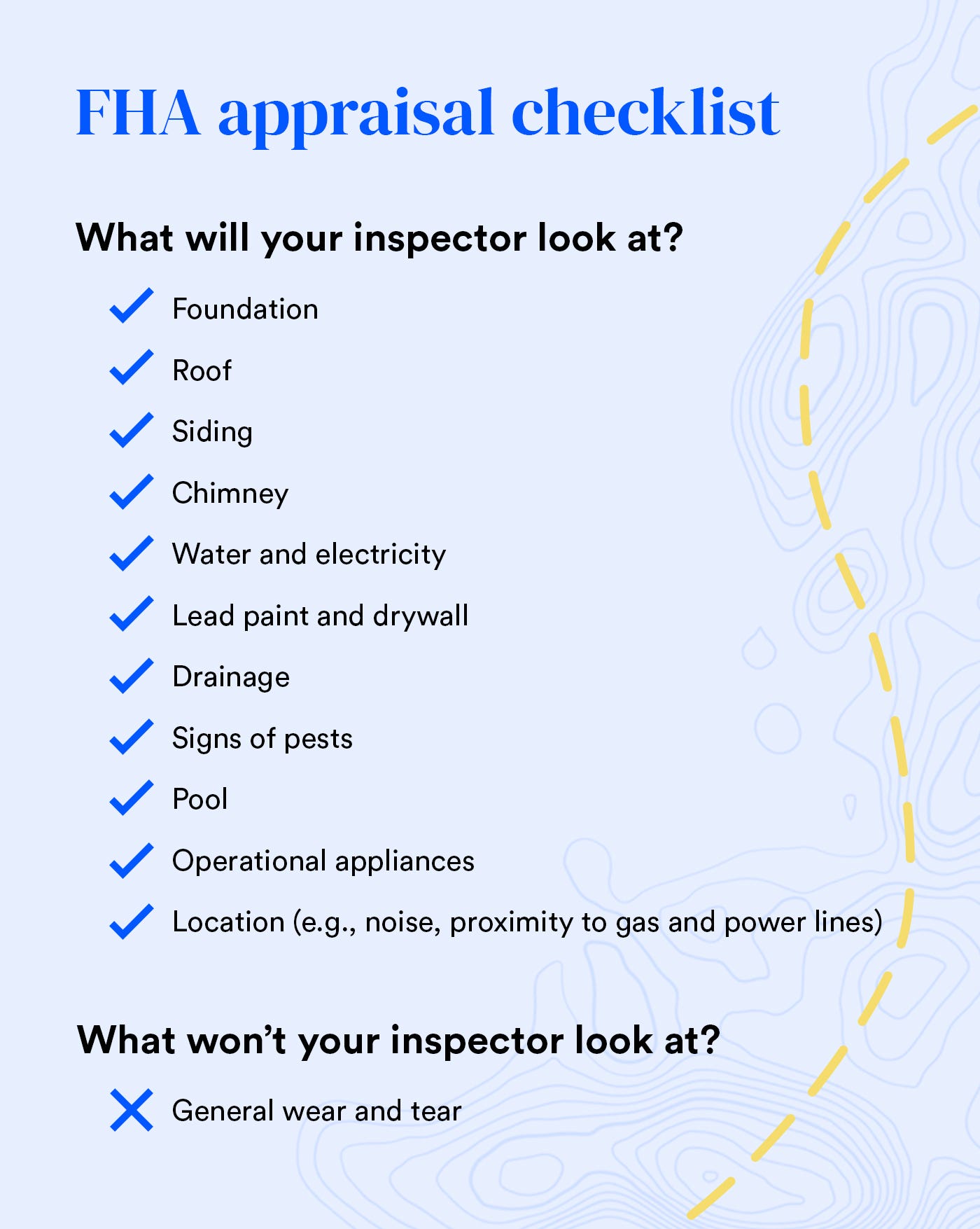The Good Brigade/Getty Images
Key takeaways
- An FHA appraisal assesses your home’s market value and condition to determine whether it’s both safe to inhabit and a good investment.
- You’ll need to pass the FHA appraisal to receive an FHA loan for the property.
- Common problems raised by an FHA appraisal include peeling paint, damage to major systems such as HVAC or plumbing and drainage issues.
When you buy a home with a loan from the Federal Housing Administration (FHA), the property must undergo an FHA appraisal. In addition to assessing how much the home is worth, like an appraisal for a conventional loan, an FHA appraisal determines whether it meets agency standards for safety and security.
What is an FHA appraisal?
An FHA appraisal is a home appraisal in which a certified professional evaluates a home that will be purchased with an FHA loan. The process is designed to determine:
- The home’s market value. Like a lender for a conventional loan, the lender for an FHA loan and the FHA itself want to ensure that they’re not lending or guaranteeing more than the home is worth.
- That the home meets “minimum property requirements.” This portion of the appraisal is similar to an inspection for a conventional loan. Essentially, an FHA appraiser will assess whether the home meets standards set by the U.S. Department of Housing and Urban Development (HUD) for safety, soundness and security. If the home is new construction, it must meet “minimum property standards.”
Appraisal vs. home inspection
An appraisal suggests what a home might be worth based on recently-sold, comparable properties. Inspections help buyers understand whether a home has any major damage or other conditions that might make it unsuitable for purchase.
Conventional lenders require an appraisal and highly recommend, but don’t require, an inspection. While the required appraisal for an FHA loan also covers some aspects of an inspection, you may also want to get a separate inspection.
How does an FHA appraisal work?
The FHA appraisal process typically looks like this:
- Appraiser visits: An FHA-approved, licensed appraiser takes photos of and notes about property’s condition, including its interior, exterior and surroundings.
- Appraiser writes a report: The appraiser compiles their findings into a report, which outlines the features of the property — including any defects — and provides an opinion on its market value.
- Appraiser makes recommendations: If the appraiser believes the property doesn’t meet HUD standards, he or she will indicate the repairs necessary and their approximate cost.
If an FHA appraiser can’t determine whether a property meets HUD’s standards, the mortgage lender may order an additional appraisal.
In general, you can expect an FHA appraisal to be completed within a week.
FHA appraisal guidelines
During an FHA appraisal, the appraiser will examine both the local market and the property itself. If you intend to use an FHA loan, knowing a little bit about the process can help you know what to look for as you tour properties.
Market research
To assess the value of a home, an appraiser will research the local residential real estate market and the sale price of comparable properties that have changed hands recently.
Appraisers must cite some specific pieces of market research, including:
- Two comparable homes sales completed within 90 days
- Three recently closed sales in the same subdivision
- Two active listings or pending sales
FHA appraisal checklist
The appraiser will also look at the property itself when making an appraisal. HUD’s Single Family Housing Policy Handbook details a long list of conditions that will be reviewed as part of the appraisal process.
When it comes to the property itself, the appraiser will ensure it meets HUD’s standards by reviewing the following:
- Physical features: Including the foundation, roof, siding, chimneys and drywall. An inspector must also ensure there’s no unremediated lead paint.
- Utility and systems: Such as water, electrical, plumbing and HVAC. Inspectors also review lighting, sewage, appliances and outdoor features, like swimming pools.
- Environment: Any potential hazards or nuisances around the home, from nearby power lines to an adjacent freeway or airport, or evidence of pests, such as termites. The inspector will also evaluate soil and yard grading.

EXPAND
What are the FHA minimum property standards?
All homes being considered for FHA financing, whether single or multi-family, must meet minimum property requirements or standards. These rules, which ensure buyers purchase a habitable home, cover items such as:
- Major systems and appliances: The home’s heating, electrical and plumbing systems must all be functioning.
- Roof: The roof must be functional for at least another two years.
- Access: The property must be accessible by a safe road. The road can be either public or private.
- Utilities: Gas, electricity, potable water and sewage utilities must all be accessible.
- Foundation: The foundation must be undamaged, properly graded and have adequate drainage to prevent leaks.
Next steps after an FHA appraisal
Once the FHA appraisal is complete, the mortgage lender will review the report.
Possible outcomes include:
- No issues. In this case, you can move forward with the purchase.
- Low appraisal. The appraiser believes that the home is worth less than the agreed-upon purchase price, creating what’s known as an appraisal gap. The lender won’t provide more financing than the home is worth, so if you’d like to move forward with the purchase, you’ll have to pay the difference. You may also try to negotiate a lower purchase price or back out of the deal, but in this case, you could lose your deposit if your contract didn’t include an appraisal contingency.
- Repairs required. If the appraiser finds that the home needs significant repairs, you’ll have to negotiate with the seller to have them done before going forward with the loan. Your purchase and sale agreement (PSA) will stipulate who pays, but often, the seller is responsible. The lender may accept evidence that the repairs have been completed or require a second appraisal.
- Major hazards. If the appraiser uncovers a major issue with the home, it may not be eligible for an FHA loan.
What happens if the FHA appraisal uncovers problems?
If there are issues, “the appraisal will outline exactly what needs to be repaired for the appraisal to be FHA-compliant,” says Ralph DiBugnara, president of Home Qualified, a real estate industry platform. Typically, the repairs must be complete before closing day, though you may still be able to close if you’re delaying an outdoor fix until the weather warms up, for example. In this case, a portion of the purchase price may be held in escrow until repairs are finished.
If you’d like a longer timeline to make fixes, consider an FHA 203(k) loan, which finances a home purchase and repairs in a single mortgage. Structural alterations, reconstruction, modernization and elimination of health and safety hazards can all be addressed with a 203K loan.
What are the FHA required repairs?
Some of the most common repairs required by the FHA include:
- Peeling paint: Any areas of the home with peeling paint — including the interior, exterior and any additional structures, such as a shed or fencing — must be scraped and repainted.
- Broken windows: Broken windows and doors must be replaced prior to move-in.
- Drainage: If necessary, drainage must be reconfigured to direct water away from the house.
- Infestation: Any mice, insects or other pests impacting the home must be exterminated.
- Major systems: If any of the home’s major systems — such as heating, plumbing or electricity — are damaged, they must be repaired before closing.
FAQ
Read the full article here














